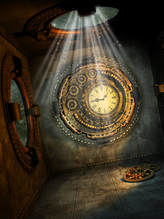
It proved quite tricky to do.
A survey of US readers by Statista last year asked people which genres they read regularly. These were the results. As you can see, people could nominate more than one genre.
Crime & Thriller 59%
Adventure 47%
Classics 44%
Fantasy 43%
Historic 42%
Romance 42%
Science Fiction 42%
Literature 40%
Horror 26%
Erotica 12%
Other 8%
Don’t know 1%
I don’t have access to the methodology or raw data behind this, but what struck me was that the top genre ‘Crime & Thriller’ was the only ‘double-barrelled’ category in the survey. I suppose it’s a natural association to combine the crime genre with the thriller genre, even though not every crime novel is a thriller, and not every thriller is a crime novel. However, wouldn’t the combining of fantasy & science fiction into one category for the purposes of this survey have been at least as natural? Most of the bookstores I’ve been to over the years pair the two. It’s been argued by some that fantasy & science fiction are both part of the continuum of speculative genre fiction. Others have maintained that genres should be defined by the primary emotion they intend to evoke, and that both fantasy & science fiction are part of what should be called the Wonder Genre. There’s even a line of argument that science fiction is actually a subset of fantasy. Whatever, the case, the two are clearly closely linked.
So what would the result have been if they had been classed as the one ‘Fantasy & Science Fiction’ category within the survey. Clearly, since the respondents were allowed to give more than one answer, you can’t simply add the two percentages together, but there’s no doubt combining the two results would have changed the results considerably, most likely putting ‘Fantasy & Science Fiction’ at number two, possibly even number one. It all comes down to how many people in the survey said they read science fiction regularly but not fantasy and vice versa.
Their results were as follows:
Crime/Mystery/Thrillers 32%
Science Fiction & Fantasy 22%
Contemporary/General Fiction 14%
Romance 7%
Historical 6%
Classics 6%
Literary 3%
Graphic Novels, Manga & Comics 3%
Horror 2%
Erotica 2%
This one has a triple-barrelled category as the most popular. Interestingly, it focused solely on adult fiction titles, so it deliberately excluded Young Adult/New Adult titles which are often also read by adults and which have a high proportion of fantasy & science fiction titles.
This belief was debunked at the 2018 SFWA Nebula Conference in a presentation based on data collected by www.authorearnings.com. It provided evidence that when ebooks and audio books are taken into account, traditional publishers are currently selling more adult fantasy & science fiction than ever before. Furthermore, in 2017, 48% of fantasy & science fiction bought in the US were non-traditionally published books. So in reality, instead of fantasy & science fiction numbers halving since 2010, as is often claimed, they have in fact doubled.
Just to add further evidence that there’s a boom in fantasy & science fiction, in 2018 Aurealis magazine has had its most successful year since going digital-only with a 41% increase in paying subscribers.
Here's to the boom!
This blog appeared in a different form as an Editorial in Aurealis #116.



 RSS Feed
RSS Feed